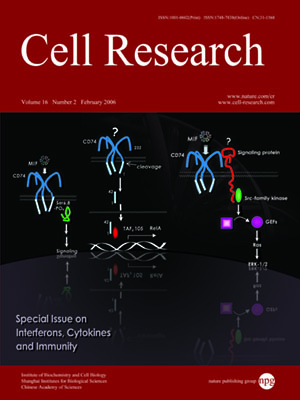
Volume 16, No 2, Feb 2006
ISSN: 1001-0602
EISSN: 1748-7838 2018
impact factor 17.848*
(Clarivate Analytics, 2019)
Volume 16 Issue 2, February 2006: 189-195
REVIEWS
Local signals in stem cell-based bone marrow regeneration
Wei Han1,3, Yan Yu2, Xin Yuan Liu3
1Stem Cell Research Center, School of Pharmacy, Shanghai Jiao-Tong University, Shanghai 200030, China; 2Shanghai Municipality Key Laboratory for Veterinary Biotechnology, Shanghai Jiao-Tong University, Shanghai 200030, China; 3Xinyuan Institute of Medicine and Biotechnology, School of Life Sciences, Zhejiang University of Technology and Sciences, Hangzhou 310018, China
Correspondence: Wei Han(weihan@sjtu.edu.cn)
The cellular basis of bone marrow (BM) tissue development and regeneration is mediated through hematopoietic stem cells (HSCs) and mesenchymal stem cells (MSCs). Local interplays between hematopoietic cells and BM stromal cells (BMSCs) determine the reconstitution of hematopoiesis after myelosuppression. Here we review the BM local signals in control of BM regeneration after insults. Hematopoietic growth factors (HGFs) and cytokines produced by BMSCs are primary factors in regulation of BM hematopoiesis. Morphogens which are critical to early embryo development in multiple species have been added to the family of HSCs regulators, including families of Wnt proteins, Notch ligands, BMPs, and Hedgehogs. Global gene expression analysis of HSCs and BMSCs has begun to reveal signature groups of genes for both cell types. More importantly, analysis of global gene expression coupled with biochemical and biological studies of local signals during BM regeneration have strongly suggested that HGFs and cytokines may not be the primary local regulators for BM recovery, rather chemokines (SDF-1, FGF-4) and angiogenic growth factors (VEGF-A, Ang-1) play instructive roles in BM reconstitution after myelosuppression. A new direction of management of BM toxicity is emerging from the identification of BM regenerative regulators.
Cell Research (2006) 16:189-195. doi:10.1038/sj.cr.7310026; published online 13 February 2006
FULL TEXT | PDF
Browse 1914


